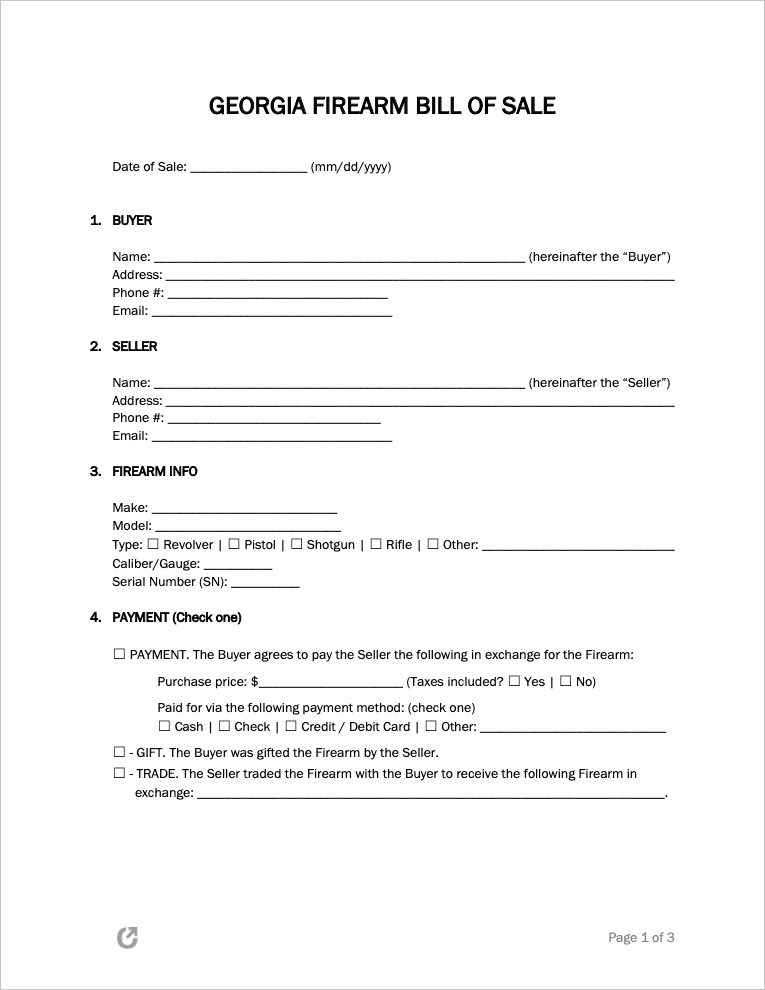Georgia Firearm Bill of Sale Form
A Georgia firearm bill of sale form holds the particulars of gun transactions. Buyers and sellers download and print the form to complete it. Each person must supply their name, their location of residence, telephone number, and email address. They also have the responsibility of revealing the gun’s characteristics, such as its brand, type, year, caliber/gauge, and serial number. Both parties sign after listing how they conducted the payment (i.e., cash, trade, or gift).
|
What is a Georgia Gun Bill of Sale?
A Georgia gun bill of sale discloses the records of a firearm transfer. It verifies the identities of the buyer and seller while highlighting the main points of the deal. Licensed dealers, but not private merchants, must impose criminal and mental health checks on purchasers.
Private sellers and licensed dealers must use caution when transferring a firearm to someone else. They must assess the potential buyer’s demeanor and note any red flags. By taking this step, they prevent sales to unlawful individuals. Law enforcement can arrest and ticket sellers who give convicts or mentally unhealthy people guns.
How to Apply for Weapons Carry License (WCL)
Law-abiding citizens of legal age in Georgia can own, purchase, and carry guns without a permit. The state updated its laws in 2022 to authorize unlicensed individuals to open and concealed carry in public and private spaces.
Unless otherwise permitted, residents with or without a license cannot carry in or near government facilities (i.e., courthouse, jail, or prison), buildings of worship, active polling locations, mental health facilities, airports, or K-12 schools.
Residents can still apply for a weapon carry license (WCL) to lessen the carry restrictions further. The permit also exempts them from dealer background checks, therefore, allowing them to obtain a gun quickly and easily.
Step 1 – Consider Eligibility
Before applying for a WCL, the individual must review the eligibility requirements. If they pass, they can take the next step in the application process.
The state requires the resident to meet the following qualifications:
- At least twenty-one (21) years of age or older (or eighteen (18) if they are in the military);
- A U.S. citizen actively residing in Georgia;
- No felony charges;
- No crime convictions;
- No addictions to drugs or alcohol;
- No domestic violence history;
- No current residency (or within the past five (5) years) in a drug and alcohol treatment center or mental hospital; and
- No conflicts with the law (§ 16-11-129).
Step 2 – Prepare
The applicant must locate a nearby county probate court office to schedule an appointment. In the meantime, they must gather the required paperwork and payment. By taking these measures, the individual ensures the county probate court does not reject their application due to incompleteness.
County probate courts require the following information: 1) identification, 2) Georgia residency verification, 3) U.S. citizenship confirmation (or INS number), and 4) payment. Applicants who want their license mailed must also provide a self-addressed envelope with a stamp.
Step 3 – Probate Court
The individual must bring the necessary documents and payment to probate court on the appointment day. First, they request an application from the clerk. Then, they hand in the completed application and pay the licensing fees.
Depending on their policies, the office may or may not take the applicant’s fingerprints. Clerks provide a law enforcement affidavit if they do not offer fingerprinting services. The individual must take the form to a police department within five (5) days of submitting the application to have their fingerprints taken.
Step 4 – Wait
Within five (5) days of applying, the judge requests a background and criminal records check. It takes about thirty (30) days for the results to come back. Once this step occurs, the judge decides to accept or deny the applicant. Depending on the selection made when submitting the information packet, the person receives notice by mail or in person.
Step 5 – Renew
A WCL lasts for five (5) years. The state recommends that applicants renew at least two (2) months before the expiration to avoid penalties or delays.
License holders must renew in person at their probate court. They must provide the license, application, identification, and payment for consideration.
